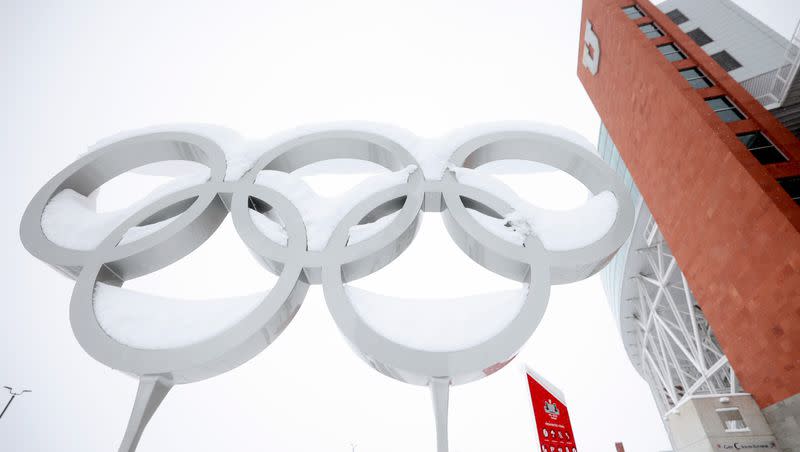More Winter Games host candidates emerge, IOC says, but won’t name names

Now there are even more contenders to host a future Winter Games.
“We have new interest,” IOC Olympic Games Executive Director Christophe Dubi told reporters during a virtual news conference Wednesday, following the second of three days of closed-door executive board meetings in Switzerland.
Dubi declined to say how many places are now in confidential talks with the IOC about hosting a Winter Games, but said the number has increased from the six previously confirmed.
“As we speak, it’s probably increasing further,” he said.
Related
Only four bids have been made public, from Salt Lake City; Sapporo, Japan; Vancouver, Canada; and, potentially, Sweden. All are looking to host the 2030 Winter Games, although Salt Lake City has said waiting until 2034 would be better financially.
Fraser Bullock, president and CEO of the Salt Lake City-Utah Committee for the Games that’s behind the bid, said given the preference for 2034, “we are hopeful that one of the interested parties” puts together a successful bid for 2030.
But he noted that takes a lot of work.
“Having many parties interested in hosting a Winter Games at some point in the future is healthy for the Olympic and Paralympic movements. However, progressing from interest to a fully approved bid is a long, challenging road,” Bullock said.
Salt Lake City’s bid was praised by Dubi, but he stopped short of saying another Olympics is coming to the city that hosted the 2002 Winter Games.
“We have ... to respect the willingness of Salt Lake City. I think they have clearly indicated that 2034 is their preference. They also said time and again that they stand ready in case of 2030,” the IOC official said.
However, he added, there’s been “a true renewed interest” in the Winter Games since last December’s decision by the IOC Executive Board to postpone a pick, calling the interest “incredibly reassuring” and “excellent news.”
Related
Before a decision can be made on where the 2030 and 2034 Olympics will be held, Dubi said the IOC needs more information on climate change, the feasibility of rotating the Winter Games among a set group of hosts and if both Games should be awarded together.
A report on those issues is expected from the IOC’s Future Host Commission in the coming months and would be discussed by the full membership at the annual session planned in Mumbai, India, in October.
That means the final choice for 2030 and 2034 would come later, Dubi said. That’s likely at the next IOC session set just before the 2024 Summer Games in Paris, although there’s no timetable under the new, less formal selection process.
Dubi said there’s no rush.
“If you look at those parties that have come to the table at this point in time, these are very mature winter markets. So I’m definitely not worried about the timing, knowing that we’re going to go ... to a region or a country that have the infrastructure and are used to organizing high-level events, being world cups or world championships,” he said.
Stepping up to organizing an Olympics is “not undoable,” Dubi said, adding regions and even multiple countries have expressed interest, similar to the so-called “European super bid” from Italy, France and Switzerland that’s been seen as stalled.
Dubi said he could not confirm a recent comment from U.S. Olympic and Paralympic Committee Chairman Gene Sykes suggesting the IOC wanted Salt Lake to host in 2034, if a “good alternative” can be found for 2030.
There are still “many steps,” the IOC official said. “But they have clearly mentioned their interest, and as you have seen, the Utah (Legislature) has taken a number of decisions most recently that demonstrate they are really committed indeed.”
Asked about the fairness of the new process allowing cities to enter into private discussions with the IOC about bidding, Dubi said there’s respect for confidentiality when those talks “are informal, where everybody is gauging the interest, the feasibility” of hosting.
Related
Keeping quiet initially means that if a bid doesn’t advance to the contract negotiation stage of the process, there’s “no damage done” and “no more losers, as we painfully have had” among bid cities, he said.
“I think it is very fair. Everybody knows the conditions. Everybody knows that there is a time to discuss behind closed doors and once we can reveal the various projects because they want to do so, then we clarify the matter,” Dubi said.
He said the issue of fairness has not been raised by “any of the interested parties at this stage.”
Bullock said the IOC’s “new flexible dialogue process allows all parties to express interest at any time. This is fair to all of us. We feel a great partnership with the IOC toward a future Games.”
Salt Lake City was selected by the USOPC in December 2018 to bid on behalf of the nation for a future Winter Games, but with Los Angeles hosting the 2028 Summer Games, there’s concern back-to-back Olympics in the U.S. would hurt sponsorship revenues.
So the focus has been on landing the 2034 Winter Games, but issues have arisen with two 2030 bidders, Sapporo and Vancouver. Sapporo is facing fallout from an Olympic bribery and bid rigging scandal from Tokyo’s 2020 Summer Games, held in 2021 due to COVID-19.
Vancouver has struggled to secure needed government backing, but Dubi said Wednesday they are “still at the table” and Canadian Olympic officials are expected to meet with local authorities in the next few weeks about the bid.
He declined to say whether Vancouver was still pursuing the 2030 Winter Games or a spot in the possible rotation of future hosts, described as a more economical alternative, although the cities participating would be limited by climate concerns.

